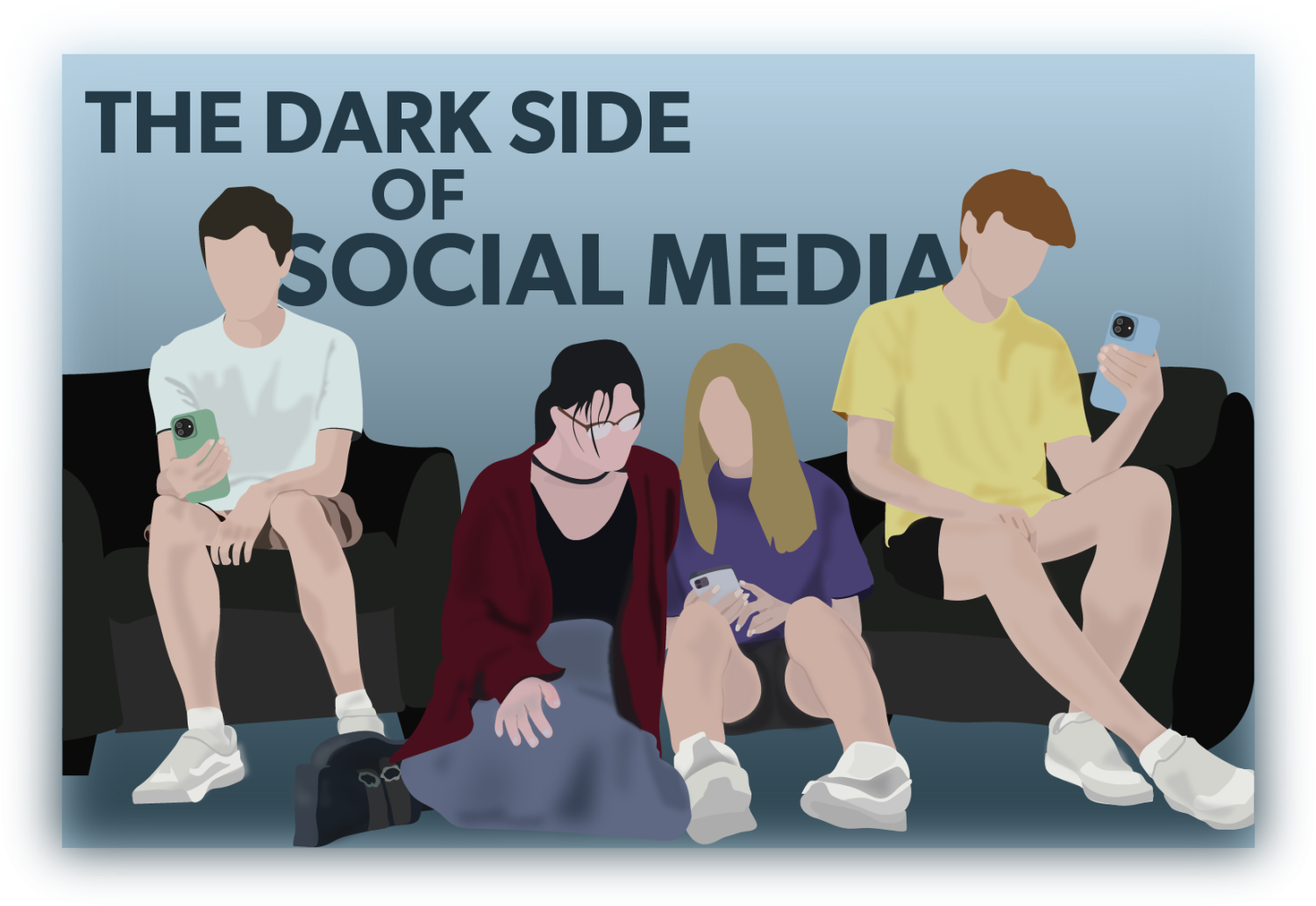From likes to loathing: How social media is negatively affecting students’ self-esteem and mental health
April 18, 2023
In today’s world, social media has become an integral part of our daily lives. With just a few taps on our smartphones, we can instantly connect with friends and family, share our thoughts and experiences and access a world of information. However, as social media has become increasingly pervasive, concerns have grown over its impacts on mental health, particularly among teenagers. Several students share their firsthand experiences with the dark side of social media and its effects on their mental health. Their struggles and triumphs provide insight into the complex and often hidden ways that social media can shape our life, for better or for worse.
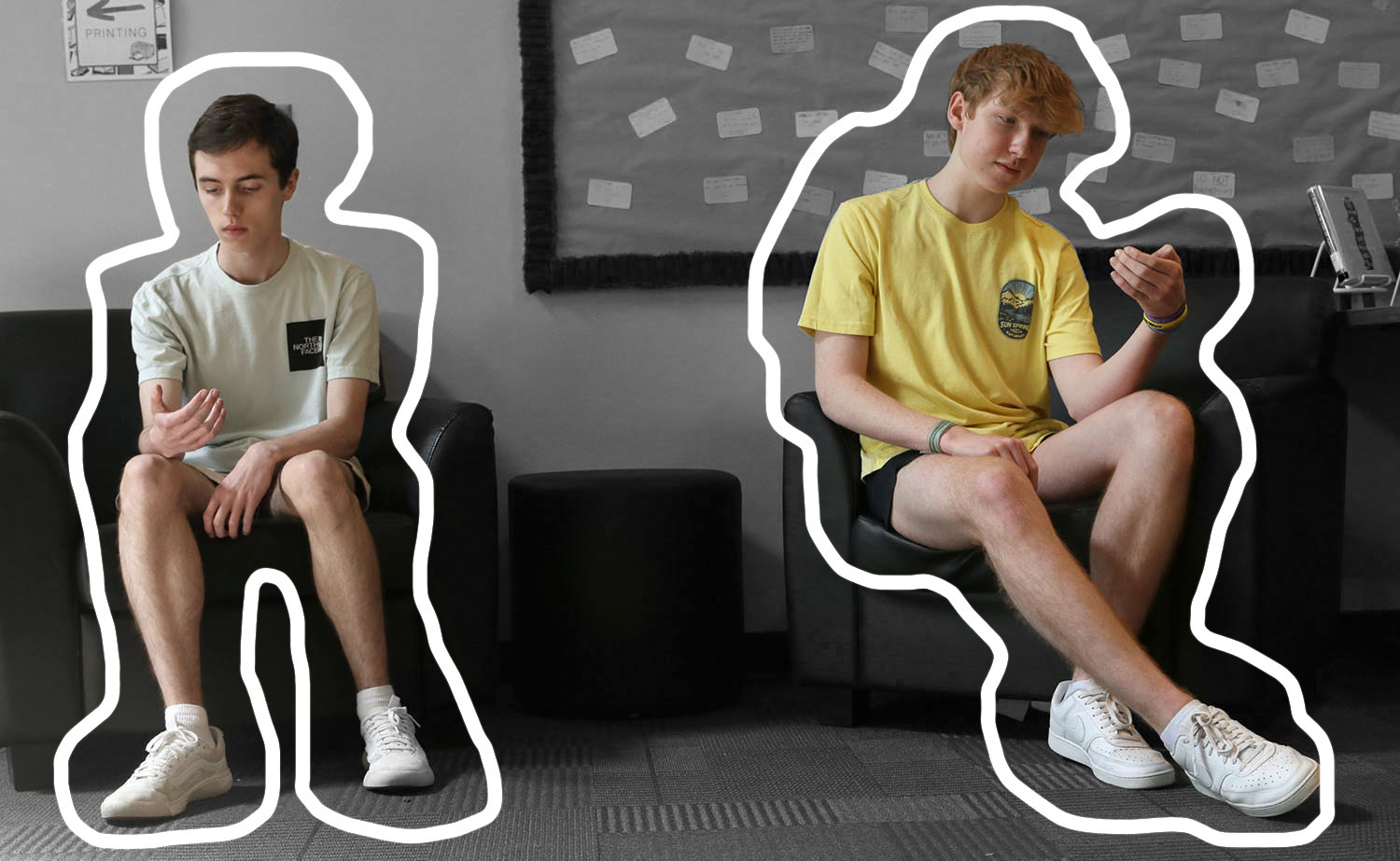
Most teenagers cannot imagine their lives without a platform like Instagram, TikTok or Twitter. However, junior Nathan Anderson and sophomore Logan Koester live the uncommon reality of navigating adolescence with absolutely no social media.
Students avoid social media on the advice of their parents
For sophomore Logan Koester and junior Nathan Anderson, abstaining from social media altogether was not a personal choice, but rather something enforced by their parents.
Koester was unaware that he was becoming a slave to his Snapchat, Instagram and TikTok accounts when his family and friends first noticed a drastic change in his behavior six months ago. After his mom forced him to delete all of his social media from his phone, Koester agreed that he had become a different person.
“My relationship with technology was very toxic,” Koester said. “I always compared myself to others. I didn’t feel addicted but I always felt like I had to be on my phone and I always had to be checking up on social media and what other people were doing.”
Koester’s obsessive habit of checking his Instagram and TikTok feeds almost hourly made him miserable in his endeavor to meet unrealistic expectations.
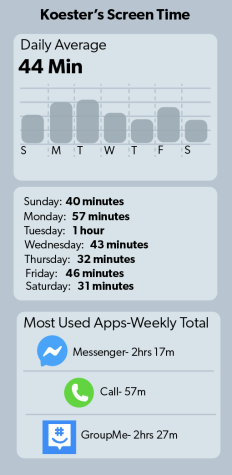
“I was just so insecure all the time,” Koester said. “I was always observing people and comparing myself to them. Even in person, I would subconsciously pick out certain things I would want from certain people like, ‘I wish I had that nose. I wish I had that body, that face.’ It’s always been something that made me feel so bad and social media just made it worse.”
According to psychology teacher Kirsten Crandall, teens’ initial desire to be involved with social media stems from wanting approval.
“Teenagers are in a stage of their development where they are forming a sense of identity. ‘Who am I?’ ‘What do I stand for and represent?’ ‘What do people think of me?’,” Crandall said. “The primary source for answering these questions are their peers. The quickest access to feedback from your peers is social media. It’s a short cut for the strongest adolescent drive. Sometimes a beneficial one and sometimes a wildly destructive one.”
Just like Koester, junior Nathan Anderson is not allowed to have any social media per his parents’ rules. Anderson will be allowed to get social media if he chooses when he becomes an adult on his 18th birthday. Based on his own beliefs about social forums, Anderson agrees this is fair.
“I feel like if I was on social media, people would always be seeing what I was doing all the time,” Anderson said. “I really value my personal time and I don’t like the idea of putting all of my information out there. Also, partly, I’m worried about certain apps tracking my activity, but I’m not as worried about that as I used to be.”
Crandall explains that it is important for people to set and recognize their limits when it comes to social media..
“Social media has its benefits and can be a valuable tool. But, it is in no way on your side or looking out for you,” Crandall said. “It will take advantage of you, actively, if you don’t take back some agency and assert your control over it. You need to look out for yourself and put social media in its right place. You’re the only one who can.”
Koester wanted to solve his social addiction problem himself, but several long conversations with his mom helped him realize walking away was best.
“I was at a very low point, I was so upset,” Koester said. “I don’t know why I was so upset and I didn’t know why I was so depressed. My mom eventually said, ‘Logan, we have to stop this. You’re not the same person.’ At first, I was very against it. I thought, ‘I just need to get through this myself.’ But I finally realized deleting those apps altogether was the best thing I could’ve done.”
Since leaving TikTok, Instagram and Snapchat, Koester has no regrets.
“I am so much happier and focused on stuff that matters to me because I’m not constantly looking at other people who are ‘perfect’ and comparing myself,” Koester said. “I’m much more carefree. I don’t care about what others think of me as much anymore which has improved my mood and my relationships with my mom and friends.”
Anderson is content with currently being disconnected from the online world, but sees a possible future on social media as long as he is able to use it in moderation.
“I might get social media next year. I’ll be an adult and I feel like I’ll be able to communicate with my friends better through social media,” Anderson said. “As an adult, I should be more responsible and more mature to handle it and everything that comes with it.”
While he believes it’s a matter of everyone’s personal decision, Koester advises other students who are considering removing themselves from social media to consider how they would feel in its absence.
“It’s their choice, but I would say you’d feel so much better if you got rid of it,” Koester said. “If they are in the position that I was in, it will probably work for them because it worked so well for me.”
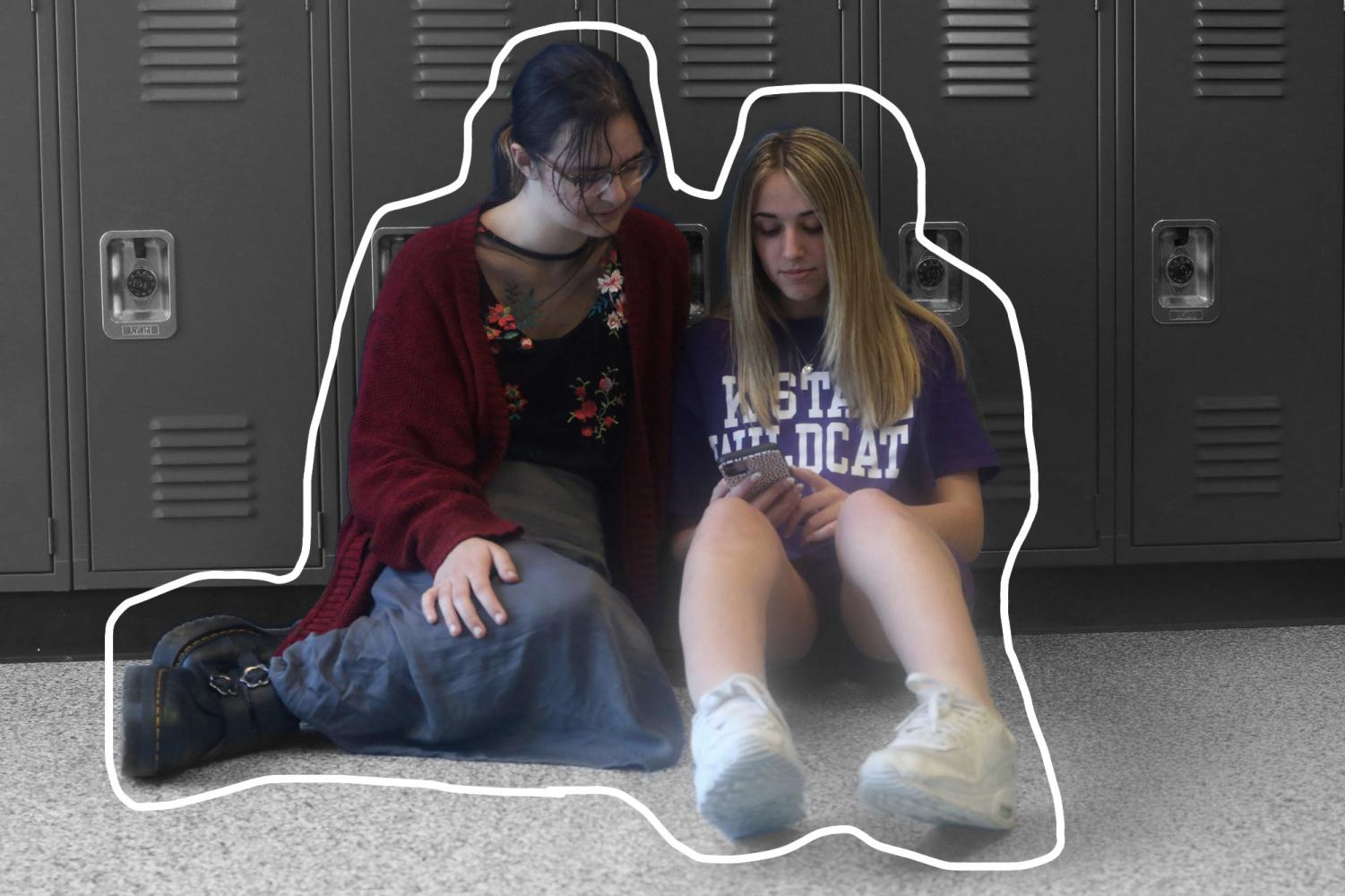
Juniors Olivia Peters and Reagan Roberts initially downloaded social media apps to stay connected to the outside world and fit in with friends. When their relationships with TikTok and Instagram grew toxic, Peters and Roberts deleted the apps from their phones.
Juniors voluntarily give up social media in seeking to improve their mental health
While some teens do not have social media due to parental rules, other students made the choice to delete these apps themselves for the benefit of their mental health.

Many students do not experience negative effects when they first start using social media. For junior Reagan Roberts, it was initially a positive thing that helped her to fit in.
“My friends had social media and so I wanted to feel included,” Roberts said. “It was fun seeing everybody else’s photos and I just wanted to be a part of it.”
Crandall explains what happens psychologically that compels people to join social media.
“Social media offers us a taste of some of our most foundational human needs,” Crandall said. “This could include community and connection, identity validation, etc. These are innate human drives and things like Instagram, TikTok, Twitter, etc give us the sense we are meeting those needs.”
Junior Olivia Peters downloaded TikTok in 2020 with similar goals in mind, but ended up deleting it about a year later.
“During COVID, it was important to be able to connect [with people my age], but on the other hand, it became something that I would do in order to not do other things,” Peters said. “I would just be in my room for hours avoiding the world because I was bored. I could look at TikTok, but I wasn’t really doing anything either. I wasn’t going out and talking to people or doing anything.”
Roberts had a similar experience with Instagram. Using the app became draining for Roberts as she found herself obsessed with what perfection looks like.
“When I had Instagram, my mental health was constantly decreasing because I was constantly comparing myself to all the other people I’ve seen,” Roberts said. “Instagram portrays the perfect life version or perfect lives of everybody and that became really toxic for me.”
Eventually Roberts decided scrolling through social media was not worth the price of her mental health.
“I just was tired of it,” Roberts said. “I was tired of constantly getting on Instagram and being like, ‘Oh, I wish I looked like them [or] I wish I had those things.’ [Eventually] I was just like, enough’s enough.”
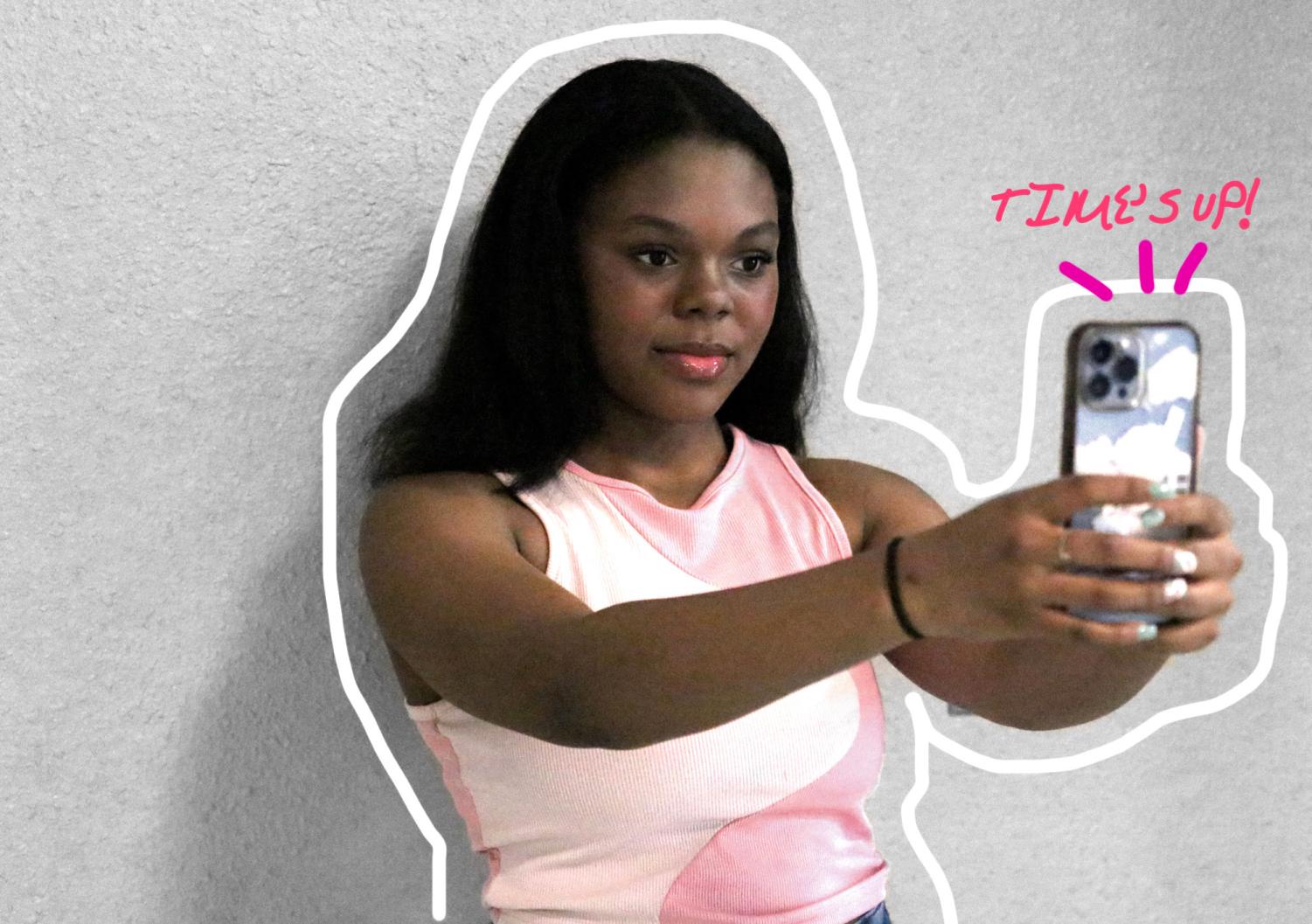
Freshman Tristyn Jones recently began keeping her time spent on social media at arm’s length by setting time limits for certain apps to better monitor her mental health.
Setting time limits for certain apps provides beneficial compromise to students
Personalizing and limiting social media usage can provide the balance between mental health and staying connected that many students are looking for. While reaching this compromise can be done through a parent setting and strictly enforcing time limits for certain apps, some students have taken this responsibility into their own hands.
For freshman Tristyn Jones, personalizing the social media algorithm so it pushes out more positive content was made possible through setting specific time limits for herself.
“Before, I never liked getting off TikTok or Instagram and feeling bad about myself so I started setting time limits to make sure I wasn’t getting absorbed in this world that I knew was fake,” Jones said. “I tried to just find things that make me happier because after some point of watching so many videos, your whole feed will just be what you want it to be. By setting those time limits I was able to completely revamp my feed into something better than it was before,” Jones said.
Through setting these screen time limits, Jones has found that social media can be used to enhance off-line hobbies.
“I’m starting to get into more hobbies such as reading,” Jones said. “I would search up things on TikTok so I’ll get more things about books instead of about looks.”
Peters recently downloaded Instagram and Snapchat after deleting all social media for her mental health. She is now using it similarly to Jones: a means to enhance her real life hobbies by limiting how much time she spends on the app.
“I’m working to use it as a means of doing things outside of [online],” Peters said. “My Instagram is full of a lot of art recently and I’m trying to make it the kind of art that I might get inspired to do on my own time, so that it can become a way to do things outside of just social media instead of just doom scrolling.”
Similarly, Roberts recently redownloaded Instagram after her break from the app too. Roberts describes the avenues she is taking to keep her social media experience positive this time around.
“I limit my time on there and I just tell myself that Instagram is just a picture; it’s not as important to me,” Roberts said. “Also, [my advice is to] follow people that inspire you. So when you are looking at stuff, it’s not all about people. There are good things on there.”
According to Crandall, these screen time limits are not just another option, they are psychologically beneficial.
“The benefits of setting limits with the amount of screen time are that your brain will be focused to see the word in other lights outside of social media feeds,” Crandall said. “It will create balance in perspective. Staying away from social media altogether allows a person to have full control over their system. They get to decide what information gets into headquarters, your brain and therefore what headquarters is using to construct an understanding of reality.”
This more accurate construction of reality was exactly what Roberts and Peters were looking for when rejoining social media. Looking at the big picture, Peters hopes adults can begin to see social media as a positive space while staying aware of its harmful, underlying features.
“Overall, adults should see social media as a space that can be good and also set a good example for how that can happen so long as they don’t become overly engrossed in it like I did,” Peters said.
